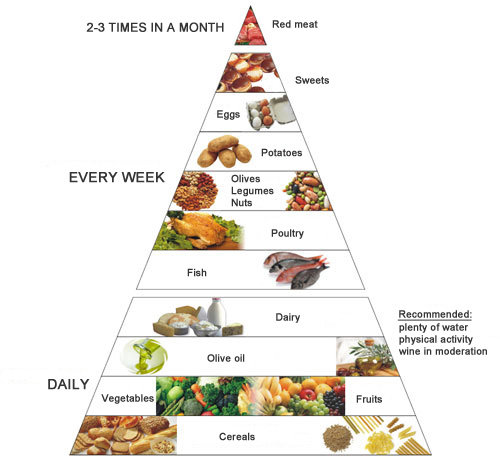Mediterranean diet
The ‘Mediterranean Diet’ refers to the traditional diet of European peoples in the Mediterranean, that is, Spain, Italy, Greece and Cyprus, during the 1950s. This diet is characterized by the daily consumption of fruit, vegetables, dairy products and carbohydrates that are mainly found in cereals like rice and grains and their products (bread and pasta). The consumption of fat though, and particularly of saturated fatty acids, is very limited, the main form of fat being olive oil.
The value of the ‘Mediterranean Diet’ emerged from the Seven Countries Study (Finland, USA, Holland, Italy, Yugoslavia, Japan and Greece) in the 1950s which was started by the American scientist Keys. Of the afore-mentioned peoples, the Greeks, and in particular the Cretans, had a lower mortality rate from cardiovascular diseases and cancer.
The consumption of plenty of fruit, vegetables and whole wheat products, the limited consumption of red meat and processed foods, and the relatively high percentage of fat from olive oil and nuts, combined with increased physical activity (working outdoors) result in a reduction in the occurrence of diseases related to diet (cardiovascular diseases, obesity, diabetes and other degenerative diseases).
THE MEDITERRANEAN DIET PYRAMID

PASTA IN THE MEDITERRANEAN DIET
Nowhere can enjoyment and nutritional value be better combined than in a delicious, hot plate of pasta.
Easy to cook, wonderfully tasty and with unique advantages, pasta has rightfully become one of the most popular dishes in the world. It can be kept for a long time, is very easy to prepare and offers unique low-calorie taste experiences when accompanied by simple sauces, vegetables, lean meat, fish or low-fat cheese.
Indeed over recent years the view has prevailed in the international scientific arena that the traditional diet in Mediterranean countries is healthier than that of the west and an important factor for longevity.
Pasta, an integral part of the Mediterranean diet, can be safely consumed as it is made from cereals which are at the base of the pyramid.
The myth that pasta is fattening has been shattered as it has been scientifically proven that pasta is no more fattening than other foods. The carbohydrates it contains are complex and are the best source of energy needed by the human body, while it has more protein than other rival carbohydrates (rice or potatoes). That is why pasta is recommended in particular for athletes, children and the elderly.
The ‘HELIOS’ Pasta Industry was the first in Greece to start producing whole wheat pasta in 1981 and is the only one in Greece producing organic pasta.
‘HELIOS’ organic pasta is produced from 100% organically grown durum wheat semolina. With the utmost respect for the final consumer, organic products are grown using gentle farming methods without pesticides, insecticides or other chemical substances that are harmful to health and to the ecosystem.
As far as ‘HELIOS’ whole wheat pasta is concerned, the percentage of fibre is particularly high, about 10% dietary fibre. It therefore completes your daily plate with the addition of vitamins (B1, B2), calcium, iron, selenium and phosphorus which help the body to function normally.
